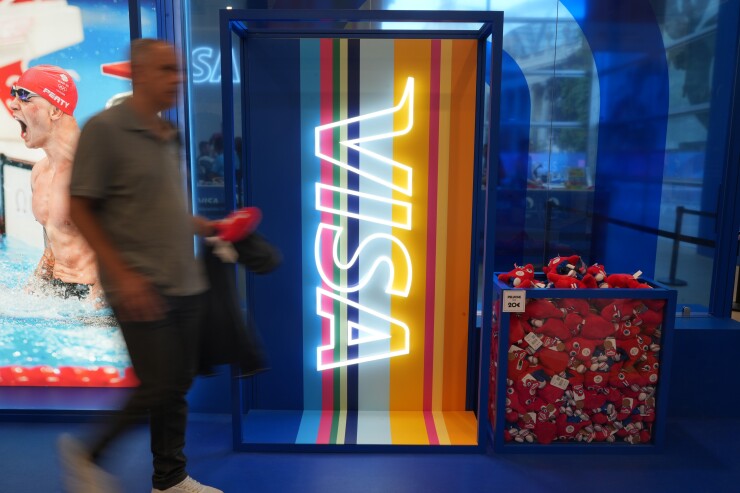
UPDATE: This article includes news about Visa's $1.5 billion set aside for legal fees.
With
The Department of Justice has
For companies that rely on debit transactions as a way to build relationships with banks, any reduction of Visa's control over transactions would make it easier for other firms. A research note from TD Cowens said the suit could benefit FIS, which owns NYCE; and Fiserv, which owns STAR/Accell; debit routing networks that compete with Visa and Mastercard.
Visa dominates the U.S. debit market with a 57% market share, according to TD Cowen, citing Nilson data. That compares to Mastercard at 22% and alternative networks at about 21%. Over the prior five years, Visa's share has grown 5% while Mastercard has gained 1%.
There are several legacy debit networks owned by bank tech firms and a handful of regional independent networks like Shazam, said Aaron Press, research director at IDC.
"These alternative networks have been struggling to remain relevant at the point of sale as [
The DOJ suit follows a
"One of the biggest challenges here is that merchants want lower interchange, while issuing banks want higher interchange," Press said. "The networks, meanwhile, use interchange to attract issuers. If it's too low, no one issues their cards, but if it's too high, merchants will steer to other options. Network revenue comes from flat transaction fees, so it's in their interest to keep transactions on their networks."
The growth of digital payments, particularly during and after the pandemic, is also playing a role in the DOJ suit because the rules regarding online debit payment routing do not directly address payments technology that matured following the Durbin Amendment.
The Durbin Amendment had many unintended consequences, Press said, adding this included Visa and Mastercard changing their fee structures to create non-interchange incentives to continue routing debit transactions over their networks.
"This is especially true when it comes to cards issued by smaller, Durbin-exempt banks, who can charge significantly more for debit," Press said.
Technology securing online payments may have contributed to these indirect incentives. Visa and Mastercard are the major providers of tokenization, which replaces account data with a value called a token for each payment, making that value worthless to crooks if stolen.
The card networks began
The DOJ is determining if the card network tokenization services are steering payments toward Visa and Mastercard at the expense of other networks.
The Visa DPS processing service and the Visa Token Service give it control not only over the network switching that routes payments, but also debit card processing and tokenization, said Aaron McPherson, a payments consultant.
"Tokenization has been a sore point for alternative debit networks, because only one network brand can be supported by a token, and there are incentives to tokenize the Visa network brand, even if theoretically another brand could be chosen," McPherson said. "Alternative debit networks would have to stand up their own token services, and somehow get merchants and banks to use them."
To the extent that the DOJ lawsuit forces Visa to divest its token service and/or debit processing service, this could create opportunities for FIS, Fiserv and Discover to increase their volumes by enabling greater choice of networks in debit cards, McPherson said.
Fiserv, FIS, and the DOJ did not respond to requests for comment. "Anyone who has bought something online, or checked out at a store, knows there is an ever-expanding universe of companies offering new ways to pay for goods and services," said Julie Rottenberg, general counsel for Visa, in an email. "Today's lawsuit ignores the reality that Visa is just one of many competitors in a debit space that is growing, with entrants who are thriving."
Visa in the past has said the regulatory pressure to
"Visa could respond to the lawsuit by voluntarily opening up its ecosystem, or by adjusting its pricing, in an attempt to undermine the DOJ's case," McPherson said. "I also expect Visa to argue that Mastercard is a strong competitor, and that the debit card market does not reach the threshold for a finding of monopoly power."






